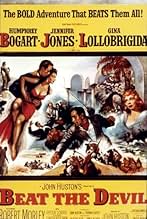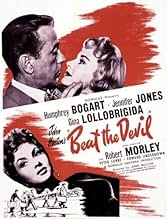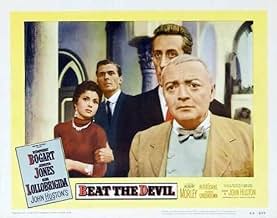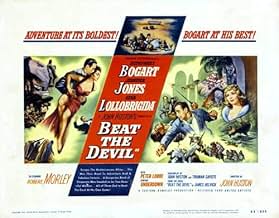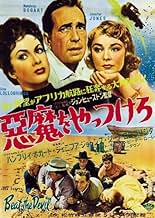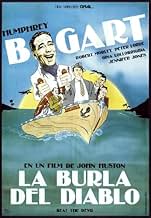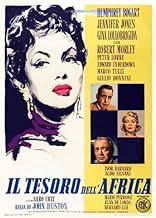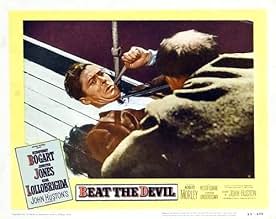IMDb RATING
6.4/10
11K
YOUR RATING
On their way to Africa are a group of rogues who hope to get rich there, and a seemingly innocent British couple. They meet and things happen...On their way to Africa are a group of rogues who hope to get rich there, and a seemingly innocent British couple. They meet and things happen...On their way to Africa are a group of rogues who hope to get rich there, and a seemingly innocent British couple. They meet and things happen...
- Awards
- 1 win total
Saro Urzì
- Captain of SS Nyanga
- (as Saro Urzi)
Alex Pochet
- Hotel Manager
- (uncredited)
Mimmo Poli
- Barman
- (uncredited)
Featured reviews
The above is a line from "Black Widow" that I've always liked. I guess it was called to mind because "Beat the Devil" is a black comedy. Well, it's an odd comedy anyway.
The 1953 film had absolutely everything going for it, including Humphrey Bogart, Jennifer Jones, Gina Lollabrigida, Peter Lorre, Robert Morley, directed by John Huston with a screenplay by Truman Capote. What more could you ask for? I don't know, but something.
The story concerns crooks stuck in Italy while they wait for a steamer to be repaired that is to take them to Africa. There, they will buy land that has uranium on it, though no one knows that. They're allegedly selling vacuum cleaners. Also traveling on this steamer are a British woman (Jones) and her husband. He supposedly is landed gentry in England, but is he? The crooks wonder what he's up to, and the wife keeps changing her story.
There is a lot of humor to be had in this film - the situation is funny, the denouement is wonderful, there is some witty dialogue and there are clever situations that go on during the film that are amusing. The problem is that nobody cares.
The film, which looks like it cost about a dollar to make, is too disjointed, and there are long sections where nothing interesting happens.
One of the posters, who really liked the film, commented that people don't like it because the actors aren't going for laughs. Well, I'm not one of those people. Acting 101 says you don't go for laughs - you play the situation and the characters for real and the laughs happen. That doesn't mean, however, that you pace it like it's Long Days Journey. Bogart had wonderful timing no matter what, and it's evident here, particularly in the car scene on the way to the restaurant, where the character's glibness is apparent. The problem isn't in any person, it's in the direction. I don't believe Huston had a sense of comedy. He could be brilliant, but this was not his thing.
Still, "Beat the Devil" is worth seeing, but it's hard to keep your attention on it.
The 1953 film had absolutely everything going for it, including Humphrey Bogart, Jennifer Jones, Gina Lollabrigida, Peter Lorre, Robert Morley, directed by John Huston with a screenplay by Truman Capote. What more could you ask for? I don't know, but something.
The story concerns crooks stuck in Italy while they wait for a steamer to be repaired that is to take them to Africa. There, they will buy land that has uranium on it, though no one knows that. They're allegedly selling vacuum cleaners. Also traveling on this steamer are a British woman (Jones) and her husband. He supposedly is landed gentry in England, but is he? The crooks wonder what he's up to, and the wife keeps changing her story.
There is a lot of humor to be had in this film - the situation is funny, the denouement is wonderful, there is some witty dialogue and there are clever situations that go on during the film that are amusing. The problem is that nobody cares.
The film, which looks like it cost about a dollar to make, is too disjointed, and there are long sections where nothing interesting happens.
One of the posters, who really liked the film, commented that people don't like it because the actors aren't going for laughs. Well, I'm not one of those people. Acting 101 says you don't go for laughs - you play the situation and the characters for real and the laughs happen. That doesn't mean, however, that you pace it like it's Long Days Journey. Bogart had wonderful timing no matter what, and it's evident here, particularly in the car scene on the way to the restaurant, where the character's glibness is apparent. The problem isn't in any person, it's in the direction. I don't believe Huston had a sense of comedy. He could be brilliant, but this was not his thing.
Still, "Beat the Devil" is worth seeing, but it's hard to keep your attention on it.
Hadn't seen this film in a long time and I'm glad to have caught it again. It's at the apex of black-and-white barely tongue-in-cheek comedies with a stellar cast that had a blast making the film.
Jennifer Jones, beautiful as always, seems barely able to stay inside her role, laughter threatening to break out at any moment. Humphrey Bogart has a recurrent quizzical "Am I really doing this?" expression.
Tied in with a gang of bumbling crooks seeking a fortune in uranium in Africa, illicitly of course, Bogart, married to a cute Gina Lollabrigida, falls in love with a faux English gentleman's wife as fast as his spouse goes for the supposed representative of the landed gentry. Of course cuddling and sweet words substitute for sex.
Robert Morley, always funny, is the putative leader of a gang that can't get their act together with Peter Lorre shedding his customary menacing stare for a busman's holiday as a gangster with a sense of humor.
The action ranges from beautiful Italy to a placid sea voyage aboard a rickety tub commanded by a rum-soaked moron whose Italian expletives are not understandable but who cares? The main characters, shipwrecked, wind up on an African shore where they're greeted by what today are embarrassingly stereotyped Arabs (I cringed at one of the European's comic invocation of Islam but then the movie has to be taken on its own terms and time, right?).
The resolution is lame - the characters all look ready to leave the set and get drunk before undertaking a new film. But this is one of the best spoofs of the noir genre and what makes it fly is the ensemble of first-rate actors in roles neatly the opposite of those they were usually seen performing.
Rent it! (Please)
Jennifer Jones, beautiful as always, seems barely able to stay inside her role, laughter threatening to break out at any moment. Humphrey Bogart has a recurrent quizzical "Am I really doing this?" expression.
Tied in with a gang of bumbling crooks seeking a fortune in uranium in Africa, illicitly of course, Bogart, married to a cute Gina Lollabrigida, falls in love with a faux English gentleman's wife as fast as his spouse goes for the supposed representative of the landed gentry. Of course cuddling and sweet words substitute for sex.
Robert Morley, always funny, is the putative leader of a gang that can't get their act together with Peter Lorre shedding his customary menacing stare for a busman's holiday as a gangster with a sense of humor.
The action ranges from beautiful Italy to a placid sea voyage aboard a rickety tub commanded by a rum-soaked moron whose Italian expletives are not understandable but who cares? The main characters, shipwrecked, wind up on an African shore where they're greeted by what today are embarrassingly stereotyped Arabs (I cringed at one of the European's comic invocation of Islam but then the movie has to be taken on its own terms and time, right?).
The resolution is lame - the characters all look ready to leave the set and get drunk before undertaking a new film. But this is one of the best spoofs of the noir genre and what makes it fly is the ensemble of first-rate actors in roles neatly the opposite of those they were usually seen performing.
Rent it! (Please)
"Beat The Devil" is one of Bogart's more unusual films. Scripted by none other than Truman Capote and John Huston, it is a very entertaining, offbeat noir satire (quite a description). Upon first viewing a lot of the humor may get lost, but view it a second time, and you can not help but laugh out loud at many of the jokes.
The cast is absolutely top notch. Bogart is perfect as Billy Dannreuther, a man who has a friend that will line him and his associates up with some land in Africa that is rich with uranium. It's always nice to see Bogie prove that he had a great sense of humor, and didn't mind poking fun at himself. Jennifer Jones, who, for some reason, always reminded me of Vivien Leigh (in "Streetcar")in this picture is terrific as Mrs. Chelm. But it is Robert Morley who steals the picture for me. Sometimes menacing, sometimes charming, he is a delight to watch.
Huston and Capote have done a great job of blending the different genres without letting them get all caught up in each other. I do wish that the final scene was written a little better, but the movie is still a lot of fun.
Caution - because the film was allowed to enter the public domain, there are a lot of really lousy prints out on the market, even on DVD. If you want this film for your own collection, do yourself a favor and spend a couple of extra dollars and buy a good print.
7 out of 10
The cast is absolutely top notch. Bogart is perfect as Billy Dannreuther, a man who has a friend that will line him and his associates up with some land in Africa that is rich with uranium. It's always nice to see Bogie prove that he had a great sense of humor, and didn't mind poking fun at himself. Jennifer Jones, who, for some reason, always reminded me of Vivien Leigh (in "Streetcar")in this picture is terrific as Mrs. Chelm. But it is Robert Morley who steals the picture for me. Sometimes menacing, sometimes charming, he is a delight to watch.
Huston and Capote have done a great job of blending the different genres without letting them get all caught up in each other. I do wish that the final scene was written a little better, but the movie is still a lot of fun.
Caution - because the film was allowed to enter the public domain, there are a lot of really lousy prints out on the market, even on DVD. If you want this film for your own collection, do yourself a favor and spend a couple of extra dollars and buy a good print.
7 out of 10
Pleasant enough piffle a mildly diverting comedy-adventure hybrid Beat The Devil has a belated reputation as the last word in dry drollery, an arch in-joke to whose hidden hilarity only the select and sophisticated few are privy. Humphrey Bogart didn't think so, saying `Only the phonies think it's funny. It's a mess.' But one of the movie's formidable champions, Pauline Kael, picked up on his line and trumped it: `Yes, but it may be the funniest mess of all time.' Bogart may be the shrewder critic here; after all, he sank his own dough into the venture, which went down like the ill-starred freighter upon which the cast put to sea. Only latterly has it has it acquired dubious `classic' stature.
Beat The Devil (directed by John Huston, who co-wrote the script with the up-and-coming Truman Capote) improvises a loose, comic riff on the international adventure genre. Thankfully, it's not unhinged or absurd enough to be a dreaded `spoof,' and emphatically not one (as it's become a commonplace to assume) of the noir cycle. In narrative, point of view and look (there's no coherent visual style), Beat The Devil bears not the slightest resemblance to film noir, which, by this point, was slyly starting to parody itself anyway.
The plot's McGuffin concerns uranium deposits in central Africa, which draw a disreputable and multinational crew of opportunists who hope to strike it rich by sticking it to their various motherlands. The joke lies in that these bumblers keep getting taken in by one another's cover stories, pretensions and lies and falling for one another's spouses. It's not a bad joke, but it needs a bit more rigor to flesh it out from a skit to a feature film.
Of course it's funny, if haphazardly. A blonde Jennifer Jones, juggling an English accent as if with a mouth full of prunes, comes straight out of screwball comedy (who knew?), and Gina Lollobrigida (when not waylaid by her own attempts at English) occasionally matches her. Peter Lorre, looking much like the short and rotund Capote of the future, again displays his instinctive flair for subversive comedy (his past in sinister parts limited what might have been a long and enjoyable career). And Robert Morley, crisp as a toasted if unusually thick crumpet, serves up every line like a butler bearing a decanter of vintage port. Bogart, on the other hand, can't persuasively hide his age and infirmity, and his role as debonair lover and man of action demands superhuman suspension of disbelief (maybe he was just thinking of all the money he was going to lose).
Yet having fun doesn't have to mean that plot is irrelevant, some boring old rule made to be broken. Part of the movie's folklore is that Capote stayed up all night writing the next day's pages; maybe so, but didn't he or Huston know where they were going? Once the characters wade up on the North African shore to be apprehended by `Arabs' (surely, Bedouins?), there's no more pretense of a cohesive script or a halfway satisfying storyline. Finding a plausible way out of all the intrigue, however tongue-in-cheek it might have been, wouldn't have killed the laughs, now, would it?
Beat The Devil (directed by John Huston, who co-wrote the script with the up-and-coming Truman Capote) improvises a loose, comic riff on the international adventure genre. Thankfully, it's not unhinged or absurd enough to be a dreaded `spoof,' and emphatically not one (as it's become a commonplace to assume) of the noir cycle. In narrative, point of view and look (there's no coherent visual style), Beat The Devil bears not the slightest resemblance to film noir, which, by this point, was slyly starting to parody itself anyway.
The plot's McGuffin concerns uranium deposits in central Africa, which draw a disreputable and multinational crew of opportunists who hope to strike it rich by sticking it to their various motherlands. The joke lies in that these bumblers keep getting taken in by one another's cover stories, pretensions and lies and falling for one another's spouses. It's not a bad joke, but it needs a bit more rigor to flesh it out from a skit to a feature film.
Of course it's funny, if haphazardly. A blonde Jennifer Jones, juggling an English accent as if with a mouth full of prunes, comes straight out of screwball comedy (who knew?), and Gina Lollobrigida (when not waylaid by her own attempts at English) occasionally matches her. Peter Lorre, looking much like the short and rotund Capote of the future, again displays his instinctive flair for subversive comedy (his past in sinister parts limited what might have been a long and enjoyable career). And Robert Morley, crisp as a toasted if unusually thick crumpet, serves up every line like a butler bearing a decanter of vintage port. Bogart, on the other hand, can't persuasively hide his age and infirmity, and his role as debonair lover and man of action demands superhuman suspension of disbelief (maybe he was just thinking of all the money he was going to lose).
Yet having fun doesn't have to mean that plot is irrelevant, some boring old rule made to be broken. Part of the movie's folklore is that Capote stayed up all night writing the next day's pages; maybe so, but didn't he or Huston know where they were going? Once the characters wade up on the North African shore to be apprehended by `Arabs' (surely, Bedouins?), there's no more pretense of a cohesive script or a halfway satisfying storyline. Finding a plausible way out of all the intrigue, however tongue-in-cheek it might have been, wouldn't have killed the laughs, now, would it?
Beat the Devil (1953)
A riotous, imperfect, silly, brazen, forward thinking, throwaway, brilliant spoof.
For starters, you know something will happen with Huston directing Bogart. And throw in an aging bulging Peter Lorre as a German named O'Hara. O'Hara comes into a room and says to Bogart, playing a disaffected American, "Why do you always make jokes about my name, huh? In Chile the name of O'Hara is, is a tip top name. Many Germans in Chile have become to be called O'Hara."
And so there is a dig at a lot of stereotypes, most of them with shades of truth. The style of the film is not film noir, as many people say, but more just an intrigue or war time spy film. The most direct connection seems to be Huston's own Maltese Falcon, but even this is based on Bogart and Lorre appearing in both films (as well as a fun appearance in Beat the Devil by Robert Morely doing a kind of less pleasant Sidney Greenstreet).
I sensed a lot of direct influence from Lady from Shanghai, an overlooked and frankly brilliant and daring Orson Welles film from a few years earlier. Check out the slightly surreal plot, the strange sequences of locations (land, boat, land, with an exotic overture in the middle), and the characters themselves, including Jennifer Jones as a kind of decorative female not unlike Rita Hayworth in Shanghai. There is even a man-to-man discussion of Heyworth in Beat the Devil between Bogart and a unlikely Muslim captor in a generally hilarious scene.
The film is flawed by its own excesses at times, and by a kind of frivolousness that Welles, for one, avoided by making his film's excesses more formal and less literary. Huston, like Bogart, was literate by nature, as a lot of heavy drinking men were in those days, and the dialog, as brilliant as it is (and shepherded along by Huston and Truman Capote in tandem), isn't always in synch with the acting, and with the flow of events. So if we don't really expect anything from the plot, per se, knowing it's all just in fun, we come to expect more from the series of remarks, the twists of fate, and the yawning expectations of an audience used to very high quality writing and acting by 1953.
I know some people who just can't finish watching this because it strikes them as phony and childish. Bogart might agree--he lost money on the production. But there are some great moments, and an ongoing repartee that works well, or works superbly, at different moments. I'd cash out a couple of actors for others more idiosyncratic, I think. But no one asked me, I know. Watch it for what it is. And check out Lady from Shanghai and see if you see what I mean.
A riotous, imperfect, silly, brazen, forward thinking, throwaway, brilliant spoof.
For starters, you know something will happen with Huston directing Bogart. And throw in an aging bulging Peter Lorre as a German named O'Hara. O'Hara comes into a room and says to Bogart, playing a disaffected American, "Why do you always make jokes about my name, huh? In Chile the name of O'Hara is, is a tip top name. Many Germans in Chile have become to be called O'Hara."
And so there is a dig at a lot of stereotypes, most of them with shades of truth. The style of the film is not film noir, as many people say, but more just an intrigue or war time spy film. The most direct connection seems to be Huston's own Maltese Falcon, but even this is based on Bogart and Lorre appearing in both films (as well as a fun appearance in Beat the Devil by Robert Morely doing a kind of less pleasant Sidney Greenstreet).
I sensed a lot of direct influence from Lady from Shanghai, an overlooked and frankly brilliant and daring Orson Welles film from a few years earlier. Check out the slightly surreal plot, the strange sequences of locations (land, boat, land, with an exotic overture in the middle), and the characters themselves, including Jennifer Jones as a kind of decorative female not unlike Rita Hayworth in Shanghai. There is even a man-to-man discussion of Heyworth in Beat the Devil between Bogart and a unlikely Muslim captor in a generally hilarious scene.
The film is flawed by its own excesses at times, and by a kind of frivolousness that Welles, for one, avoided by making his film's excesses more formal and less literary. Huston, like Bogart, was literate by nature, as a lot of heavy drinking men were in those days, and the dialog, as brilliant as it is (and shepherded along by Huston and Truman Capote in tandem), isn't always in synch with the acting, and with the flow of events. So if we don't really expect anything from the plot, per se, knowing it's all just in fun, we come to expect more from the series of remarks, the twists of fate, and the yawning expectations of an audience used to very high quality writing and acting by 1953.
I know some people who just can't finish watching this because it strikes them as phony and childish. Bogart might agree--he lost money on the production. But there are some great moments, and an ongoing repartee that works well, or works superbly, at different moments. I'd cash out a couple of actors for others more idiosyncratic, I think. But no one asked me, I know. Watch it for what it is. And check out Lady from Shanghai and see if you see what I mean.
Did you know
- TriviaHumphrey Bogart was involved in a serious automobile accident during production of this film, which knocked out several of his teeth and hindered his ability to speak. John Huston reportedly hired a young British actor noted for his mimicry skills to rerecord some of Bogart's spoken lines during post-production looping. Although it is undetectable when viewing the film today, it is Peter Sellers who provides Bogart's voice during some of the scenes in this movie. However this cannot be confirmed.
- GoofsBogie enters the lifeboat wearing a plain suit but gets out wearing a pinstriped suit.
- Quotes
Julius O'Hara: Time. Time. What is time? Swiss manufacture it. French hoard it. Italians squander it. Americans say it is money. Hindus say it does not exist. Do you know what I say? I say time is a crook.
- Alternate versionsThe original American release version was truncated and had scenes moved around, making a mess of the story line. The uncut version--released overseas by Romulus--was finally restored in the U.S. by Sony in 2016.
- ConnectionsEdited into Your Afternoon Movie: Beat the Devil (2022)
- How long is Beat the Devil?Powered by Alexa
Details
Box office
- Budget
- $1,000,000 (estimated)
- Runtime1 hour 29 minutes
- Color
Contribute to this page
Suggest an edit or add missing content

Top Gap
By what name was Plus fort que le diable (1953) officially released in India in English?
Answer

